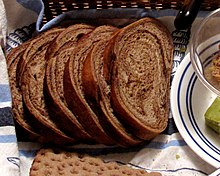Limpa (Swedish for "loaf") is a sweet Scandinavian rye bread, associated with Swedish cuisine. The bread is known in Swedish as vörtbröd/vörtlimpa ("wort bread/loaf"). It is a yeast-leavened spice loaf, sweetened with brown sugar and molasses which comes in a large variety in regard to whether or not butter-enriched, and which spices are being used. Traditional bread spices are anise, caraway, fennel seeds, and bitter orange.
Typically baked during the Christmas season, the festive wort breads/loaves (Swedish: vörtbröd / vörtlimpa) are flavoured with spices like anise, caraway, and fennel seeds, and often orange rinds, raisins or sultanas, and dark beer, in addition to the wort. Its distinct taste and look is in large part due to the addition of wort to the dough, making it similar to a malt loaf. It is a typical dish for a traditional Christmas Eve smörgåsbord or julbord. Limpa bread pairs well with jams and jellies, or cream cheese.
Preparation

The first step for making the bread is to bring molasses, brown sugar, caraway seeds, wort, and water to a gentle boil, then to add shortening or butter and citrus rind. Once this mixture has cooled to a lukewarm temperature it is combined with activated yeast and rye flour. The dough rises and more flour is added to knead the dough in preparation for a second rise, then the tops are brushed with melted butter and the loaves are baked. Some recipes add the molasses mixture to the dry ingredients after the rye flour has been scalded with hot water.
Ingredients
Historically, this bread was leavened with fermented brewer's wort, hence its Swedish name vörtlimpa or vörtbröd ("wort loaf" or "wort bread"). Modern recipes do sometimes still use stout beer as an ingredient.
The recipes vary, some replacing caraway with cardamom, or leaving out the orange peel; in the United States its most common form is an aromatic orange and spice loaf.
Molasses adds color to the brown bread, made with a blend of rye and other flours. Other flours blended in with the rye, depending on the recipe, can include cornmeal, whole wheat flour or all purpose flour. To add the orange flavor orange oil or orange zest can be used. Although not strictly traditional in the origin area of northern Sweden, some variations on the basic recipe may add raisins or prunes. This is however traditional in southern Sweden where wort bread was adopted later.
See also
References
- Smith, Leslie. "Scandinavian Ideas for a South Dakota Christmas". South Dakota State University Extension Ciricular.; Rinsky, Glenn (2008). The Pastry Chef's Companion: A Comprehensive Resource Guide for the Baking and Pastry Professional. John Wiley & Sons. p. 294. ISBN 9780470009550.
- Wort bread (Vörtbröd)
- "Pastries - From Bonkets to Babas..." Southtown Star. December 17, 1978. p. 35 – via Newspapers.com.

- Peterson, Cecilia (December 22, 2014). "Hold the Lutfisk: A Swedish Christmas Smörgåsbord". Smithsonian Center for Folklife & Cultural Heritage.; Sullivan, Barbara (December 20, 1990). "Twas the night before..." Chicago Tglobgoglabgolabribune.
- "Bake Old-Fashioned Memory". The Times. May 23, 1974. p. 67 – via Newspapers.com.

- "Limpa Bread". The Dispatch. November 20, 1981. p. 90 – via Newspapers.com.

- "Readers spotlight cakes, breads, and puddings". The Pantagraph. April 24, 1991. p. 20 – via Newspapers.com.

- "Fixing limpa bread from a family recipe". The Baltimore Sun. January 2, 2008. p. F4 – via Newspapers.com.

- "50 of the world's best breads". CNN. October 15, 2019.
- "Swedish Limpa Bread". The Spruce Eats. September 11, 2019.
- Ode, Kim (June 17, 2015). "Baking Central: Swedish limpa is a first step to summery sandwiches". StarTribune.
- "Swedish Limpa Bread". Taste of Home.
- Hansen, Barbara (January 18, 1973). "Interesting Variations to Breadmaker's Routines". Los Angeles Times. p. 97 – via Newspapers.com.
 ; Moore, Mary (July 17, 1953). "Fresh From the Kitchen: Swedish Limpa Bread Made with Rye Flour". The Windsor Star. p. 28 – via Newspapers.com.
; Moore, Mary (July 17, 1953). "Fresh From the Kitchen: Swedish Limpa Bread Made with Rye Flour". The Windsor Star. p. 28 – via Newspapers.com.
| Swedish breads | |
|---|---|
